Table of Contents
ALSO BY DAN GARDNER
THE SCIENCE OF FEAR:
How the Culture of Fear Manipulates Your Brain
DUTTON
Published by Penguin Group (USA) Inc.
375 Hudson Street, New York, New York 10014, U.S.A.
Penguin Group (Canada), 90 Eglinton Avenue East, Suite 700, Toronto, Ontario M4P 2Y3, Canada (a division of Pearson Penguin Canada Inc.); Penguin Books Ltd, 80 Strand, London WC2R 0RL, England; Penguin Ireland, 25 St Stephens Green, Dublin 2, Ireland (a division of Penguin Books Ltd); Penguin Group (Australia), 250 Camberwell Road, Camberwell, Victoria 3124, Australia (a division of Pearson Australia Group Pty Ltd); Penguin Books India Pvt Ltd, 11 Community Centre, Panchsheel Park, New Delhi110 017, India; Penguin Group (NZ), 67 Apollo Drive, Rosedale, North Shore 0632, New Zealand (a division of Pearson New Zealand Ltd); Penguin Books (South Africa) (Pty) Ltd, 24 Sturdee Avenue, Rosebank, Johannesburg 2196, South Africa
Penguin Books Ltd, Registered Offices: 80 Strand, London WC2R 0RL, England
Published by Dutton, a member of Penguin Group (USA) Inc.
First printing, March 2011
Copyright 2011 by Dan Gardner
All rights reserved

REGISTERED TRADEMARKMARCA REGISTRADA
LIBRARY OF CONGRESS CATALOGING-IN-PUBLICATION DATA
Gardner, Dan, 1968
Future babble : why expert predictions are next to worthless, and you can do better / Dan Gardner.
p. cm.
Includes bibliographical references and index.
eISBN : 978-1-101-47609-3
1. Uncertainty. 2. Fallacies (Logic) 3. Thought and thinking. 4. Perception. I. Title.
BF463.U5G475 2010
303.4909dc22 2010041293
Without limiting the rights under copyright reserved above, no part of this publication may be reproduced, stored in or introduced into a retrieval system, or transmitted, in any form, or by any means (electronic, mechanical, photocopying, recording, or otherwise), without the prior written permission of both the copyright owner and the above publisher of this book.
The scanning, uploading, and distribution of this book via the Internet or via any other means without the permission of the publisher is illegal and punishable by law. Please purchase only authorized electronic editions, and do not participate in or encourage electronic piracy of copyrighted materials. Your support of the authors rights is appreciated.
While the author has made every effort to provide accurate telephone numbers and Internet addresses at the time of publication, neither the publisher nor the author assumes any responsibility for errors, or for changes that occur after publication. Further, the publisher does not have any control over and does not assume any responsibility for author or third-party Web sites or their content.
http://us.penguingroup.com
For Mum and Dad, who gave me a future, and for Victoria, Winston, and MacDougall, who are the future
Preface
A s I read the newspaper this morning, I became engrossed in a story about what would happen in the future.
The story said the latest economic forecast of the Organization for Economic Cooperation and Development (OECD) showed growth over the next couple of years would be stronger than previously projected. I read every word avidly. Like most people these days, Im worried about the economy. The last few years have not been good ones. There was a calamitous credit crisis, the puncturing of real estate bubbles in one country after another, and a global recession worse than anything since the Second World War. Then came a weak recovery, debt crises, and fears of inflation. Or deflation. Take your pick. Who knows what will come next? Not me, although I very much want to. So when my morning newspaper delivered the knowledge I crave, from the esteemed experts at the OECD no less, it had my full and enthusiastic attention. Growth will be better than expected! Fabulous!
But then I realized something. The phrase better than expected means there was a forecast that preceded this one, and by issuing a new and different forecast, the OECD was conceding that the latest information suggested the earlier forecast was wrong. If the first forecast could fail, so could the second, and yet I had reacted to the second forecast as if it were a sure thing. It was also a little sobering to recall that the OECD had forecast smooth sailing in 2008 and 2009. Hurricane? What hurricane?
And I remembered something else. I had just finished writing a book about how awful experts are at predicting the future and how psychology compels people to take predictions seriously anyway.
Case in point: me.
I mention this because the mistakes and delusions I chronicle in this book are human follies. We are all susceptible to them, even authors who write about the mistakes and delusions of others. The goal of this book is not to mock particular individuals. Nor is it to scorn the category known as experts. It is to better understand the human desire to know what will happen, why that desire will never be satisfied, and how we can better prepare ourselves for the unknowable future.
Although most of the issues discussed in this book are very much in the news todayfrom the economy, to oil prices, to environmental catastropheI generally dont examine current predictions for the simple reason that no one really knows if they are accurate or not. I may feel that a prediction is sensible or silly, but others may feel differently, and arguing about it will get us nowhere. Only the passage of time can settle it. And so I focus on recent history: If, for example, someone predicted a second Great Depression would start in 1990 (as one economist did in a wildly popular book), then I can say with considerable confidence that he was wrong. And no reasonable person will disagree.
I should also note that while I have tried to be fair in portraying what experts predicted and how accurate those predictions were, I often had to condense entire books to a few sentences and sum up complex evidence with equal brevity. Inevitably, these summaries are full of subjective judgments: Do not take what I say as the final word. Most of the papers and articles discussed here are available on the Internet; all the books can be found in libraries and used book stores. Have a look and decide for yourself. I know that reading old predictions about a future that is now the past may sound hopelessly dull, but its not. In fact, its surprisingly enjoyable and rewarding. Its raw history, after all. There is no better way to climb inside a moment in time and see the world from that perspective. Or to realize that while the future we face may be disturbingly uncertain, twas ever thuswhich is oddly reassuring.
My profound thanks to Philip Tetlock, for doing the demanding research that is the foundation of this book and for being generous and helpful at an unimaginably difficult time in his life. A gentleman and a scholar, indeed.
Also thanks to my research assistant, Courtney Symons, and my marvelous editors, Susan Renouf at McClelland & Stewart and Stephen Morrow at Dutton. Many others contributed one way or another to the book in your hands, including Scott Gilmore, Rudyard Griffiths, Liam Scott, Bruce Schneier, and my longtime friends and colleagues David Watson and Leonard Stern. A special thanks to Paul Slovic, John Mueller, Marc Ramsay, and Barry Dworkin for reading early versions and providing invaluable thoughts and suggestions. Of course, having been written by a fallible human, this book will contain errorsfor which the author is solely responsible. All corrections and constructive criticism will be gratefully received.



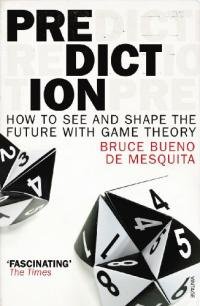
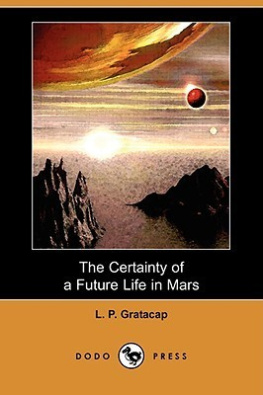
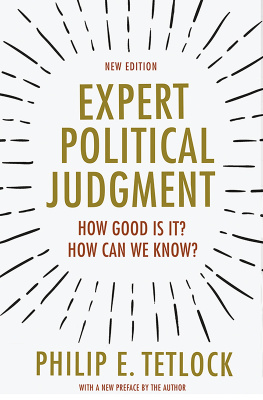
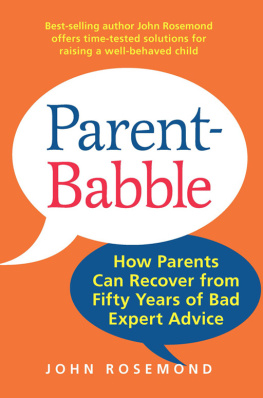
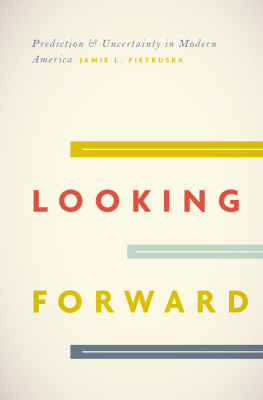
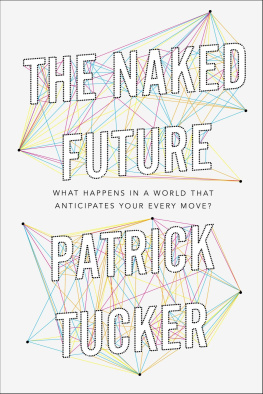
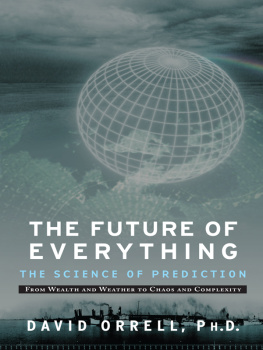
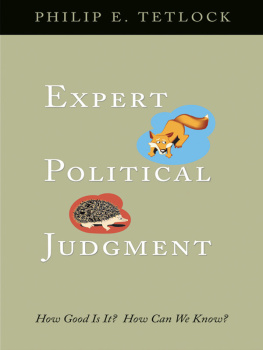
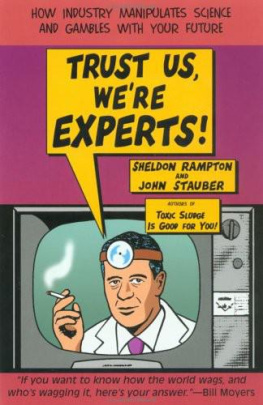


 REGISTERED TRADEMARKMARCA REGISTRADA
REGISTERED TRADEMARKMARCA REGISTRADA